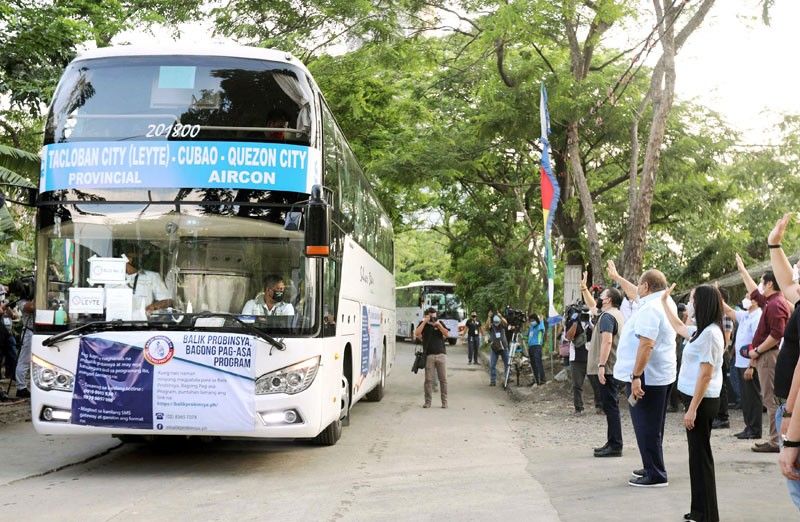Pilot testing for Balik Probinsya program takes off

MANILA, Philippines — Officials of the Balik Probinsya, Bagong Pag-asa (BP2) Council sent off the first batch of beneficiaries who qualified for the pilot rollout last Wednesday.
There were 111 beneficiaries, comprised of 85 families, who embarked on their journey back to Leyte. These beneficiaries are composed of heads of families and are part of the 3,371 identified applicants who expressed intent to go back to their homes in various municipalities in Leyte.
“I am glad that we have started today pilot testing of the BP2 Program. We can see how efficient the implementation of the program is. The government has political will,” Sen. Bong Go, the proponent of the BP2 program, said in Filipino.
“Let’s see what else we need to improve on so the BP2 program will be even more successful as we roll out to other parts of the country,” he added.
Go said the initiative aims to give hope for a better future for Filipinos, especially amid the current health crisis caused by the coronavirus disease (COVID-19) outbreak.
Last May 6, President Duterte issued Executive Order 114 institutionalizing the program and creating an inter-agency council to craft policies and programs and oversee their implementation.
“Hope is what we want to give the Filipino as they start anew in their province,” Go said, adding that the program is purely voluntary.
Before the BP2 beneficiaries left for Leyte, their documents and health clearances were processed and evaluated by concerned government agencies. Booths were set up where the National Housing Authority released boarding passes; Department of Health undertook the required PCR test for COVID-19 and presented their local health clearances; the Department of Social Welfare and Development (DSWD) released transportation and financial allowance and other forms of assistance.
In addition, the Department of Transportation and the Land Transportation Franchising and Regulatory Board prepared the five buses that took them to Leyte.
Go’s office also provided food packs, protective masks and other forms of assistance to the beneficiaries.
The Department of Agriculture also provided beneficiaries with processed agricultural products as well as starter kits for backyard planting.
The DSWD will also immediately provide food packs upon arrival to their province. A livelihood grant will also be given within 15 days from arrival. The Department of the Interior and Local Government has also coordinated with the receiving local government unit (LGU) to ensure that needed support and assistance will be provided when they arrive in their homes.
On the other hand, preparations are underway for pilot testings to other provinces. The target number of Filipinos who will go home to the provinces will be around 100-300 for every rollout, depending on the capacity of the receiving LGUs. Health protocols will be followed and similar government assistance will be provided for every roll out.
Go said Leyte was chosen because it had the most number of applicants and it was also one of the first to signify its readiness to accept returning residents.
Nine provinces with high numbers of registered beneficiaries include Samar, Negros Occidental, Zamboanga del Norte, Southern Leyte, Bohol, Northern Samar, Camarines Sur, Pangasinan and Masbate.
Interviewed during the rollout, Go cited the political will of President Duterte as an important factor in ensuring the program’s success.
“As a lawmaker, I proposed this program tot he President. Some said this was done before but it did not succeed. I told them now there is political to implement this program,” he said, adding Duterte signed EO 114 immediately and formed the council composed of more than 17 departments to maximize the use of government resources so the program will succeed.
In view of the current pandemic, Go said more and more Filipinos in Metro Manila have been expressing their willingness to go back to their respective provinces and start their lives anew.
“Before, nobody wanted to go home. Now many want to go home because of the difficulties of this crisis. Some were stranded; others did not get assistance because their families are registered in the province,” Go said.
“as a fellow probinsyano, I encourage them to consider returning to the province. The government has programs to help you,” he added.
- Latest
- Trending




























